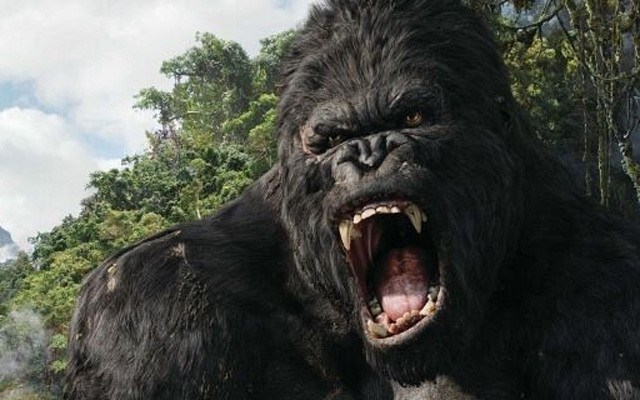As previously mentioned, the big flick this week is Kong: Skull Island, a high-tempo adventure about a "diverse team of explorers" on an uncharted Pacific island, who end up discovering much more than they bargained for. Tom Hiddleston (I Saw the Light, Avengers) stars alongside Sam Jackson (everything), Brie Larson (Room), John Goodman (Barton Fink, Argo), John C. Reilly (Talladega Nights, Criminal) and a host of lesser known (but diverse!) talent.
Of course, the real star is the monkey and his CGI monster mayhem. The poster, trailer music and visuals for this one hinted at a sort of Vietnam War take on the classic Kong tale, and there is a military thread to the story (swatting helicopters is Kong's forte) but it's actually a mix of soldiers and scientists who end up poking around the jungles of the last unmapped island on the planet. And they aren't ready for what they find.
Skull Island is a monster movie to the core (with more monsters than anyone expects), but the script never elevates it much beyond that. Perhaps it's foolish, in the era of big international box office profits, to expect subtlety in a flick about a gazillion-pound gorilla smashing everything that threatens his status quo. Kong himself is revealed early on; this is not a wait-and-don't-see flick like the last Godzilla was. (Interestingly, this Skull Island shares a writer with the last Godzilla though, so maybe that guy was overcompensating.)
In any case, King Kong has been part of the American cinematic landscape for over 80 years, and how he is portrayed onscreen can be indicative of where we are as a civilization. Some consider the 1933 Kong film an obvious statement of a racist society still decades away from desegregation. The hypothesis was that that film is about 1930s America's deep-rooted fear of the African-American male. And that given his freedom, the African male will grab all the white women and tear up America (or at least symbolic New York City) to pieces.
Subsequent remakes worked to distance themselves from that interpretation, mostly by making Kong less anthropomorphized and more like a real gorilla. Kong can't be seen as destroying America this time around because he stays entirely on his own island, and the subtext for this flick is read more as a metaphor for Western society's stubborn desire to win every battle and wipe out every threat through force. As well, this time out Larson's damsel in distress is thankfully very much less in distress than 1933's Fay Wray, 1988's Jessica Lange or even the 2005 version's Naomi Watts.
Of course, it's also just a movie. A story about some good people stuck in a tough spot doing their best to stay alive, while their biggest threat is also their only chance of salvation. There are lots of really spectacular monster battles and a bit of decent humour but the script doesn't hold up as well as it could. Kong: Skull Island wants to be Apocalypse Now meets Jurassic Park and while it never quite reaches those heights, this one is still worth checking out.
The Download/Stream of the Week is 13th, an Oscar-nominated documentary from Ava Duvernay that examines the history of racial inequality in America, from the slave trade up to now. The title refers to the 13th Amendment of the American constitution, which forbids slavery or involuntary servitude except as a punishment for crime. Duvernay's premise, quite well illustrated, is that slavery never went away but simply evolved; from chain gangs to the Jim Crow era to current mass criminalization in the privately run (and hugely profitable) U.S. prison industry. Regardless of your thoughts on the original King Kong subtext, this flick lays it out pretty clear: American society has never been too fair or just on the African-American male.
Through interviews with politicians, civil rights leaders, activists and formerly incarcerated women and men, Duvernay creates a balanced and biting film that asks: How is a country supposed to succeed when one of its biggest industries is to lock its own citizens in jail? And on a long enough timeline, how long till they come after you? On historical significance alone, 13th should have won Best Documentary Oscar this year. That O.J. Simpson doc was good but it was also six hours long — is that a doc or a miniseries? It shoulda got an Emmy.
In any case, 13th is available on Netflix and there is another 35-minute bonus video out where Duvernay talks with Oprah Winfrey about making the film. Watch them both and let's see if cinema can't change the world.




